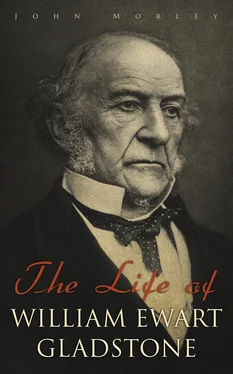Perhaps discomposed by the reproaches of reactionary friends abroad, Lord Aberdeen thought he had some reason to complain of the publication. It is not easy to see why. Mr. Gladstone from the first insisted that if private remonstrance did not work 'without elusion or delay,' he would make a public appeal. In transmitting the first letter, he described in very specific terms his idea that a short time would suffice to show whether the private method could be relied upon. 245The attitude of the minister at Vienna, of Fortunato at Naples, and of Castelcicala in London, discovered even to Aberdeen himself how little reasonable hope there was of anything being done; elusion and delay was all that he could expect. He was forced to give entire credit to Mr. Gladstone's horrible story, and was as far as possible from thinking it a detestable libel. He never denied the foundation of the case, or the actual state of the abominable facts. Schwarzenberg never consented to comply with his wishes even when writing before the publication. How then could Aberdeen expect that Mr. Gladstone should abandon the set and avowed purpose with which he had come flaming and resolved to England?
SENSATION IN EUROPE
It was exactly because the party with which Mr. Gladstone was allied had made itself the supporter of established governments throughout Europe, that in his eyes that party became specially responsible for not passing by in silence any course of conduct, even in a foreign country, flagrantly at variance with right. 246And what was there, when at last they arrived, in Prince Schwarzenberg's idle dissertations and recriminations, winding up with a still more idle sentence about bringing the charges under the notice of the Neapolitan government, that should induce Mr. Gladstone to abandon his purpose? He had something else to think of than the scandal to the reactionaries of Europe. 'I wish it were in your power,' he writes to Lacaita in May, 'to assure any of those directly interested, in my name, that I am not unfaithful to them, and will use every means in my power; feeble they are, and I lament it; but God is strong and is just and good; and the issue is in His hands.' That is what he was thinking of. When he talked of 'the sacred purposes of humanity' it was not artificial claptrap in a protocol. 247
'When I consider,' Mr. Gladstone wrote to Lord Aberdeen, 'that Prince Schwarzenberg really knew the state of things at Naples well enough independently of me, and then ask myself why did he wait seven weeks before acknowledging a letter relating to the intense sufferings of human beings which were going on day by day and hour by hour, while his people were concocting all that trash about Frost and Ernest Jones and O'Brien, I cannot say that I think the spirit of the letter was creditable to him, or very promising as regards these people.' The Neapolitan government entered the field with a formal reply point by point, and Mr. Gladstone met them with a point by point rejoinder. The matter did not rest there. Soon after his arrival at home, he had had some conversation with John Russell, Palmerston, and other members of the government. They were much interested and not at all incredulous. Lord Palmerston's brother kept him too well informed about the state of things there for him to be sceptical. 'Gladstone and Molesworth,' wrote Palmerston, 'say that they were wrong last year in their attacks on my foreign policy, but they did not know the truth.' 248Lord Palmerston directed copies of Mr. Gladstone's Letters to be sent to the British representatives in all the courts of Europe, with instructions to give a copy to each government. The Neapolitan envoy in London in his turn requested him also to send fifteen copies of the pamphlet that had been got up on the other side. Palmerston promptly, and in his most characteristic style, vindicated Mr. Gladstone against the charges of overstatement and hostile intention; warned the Neapolitan government of the violent revolution that long-continued and widespread injustice would assuredly bring upon them; hoped that they might have set to work to correct the manifold and grave abuses to which their attention had been drawn; and flatly refused to have anything to do with an official pamphlet 'consisting of a flimsy tissue of bare assertions and reckless denials, mixed up with coarse ribaldry and commonplace abuse.' This was the kind of thing that gave to Lord Palmerston the best of his power over the people of England.
ENERGETIC SYMPATHY OF PALMERSTON
In the House of Commons he spoke with no less warmth. Though he had not felt it his duty, he said, to make representations at Naples on a matter relating to internal affairs, he thought Mr. Gladstone had done himself great honour. Instead of seeking amusements, diving into volcanoes and exploring excavated cities, he had visited prisons, descended into dungeons, examined cases of the victims of illegality and injustice, and had then sought to rouse the public opinion of Europe. It was because he concurred in this opinion that he had circulated the pamphlet, in the hope that the European courts might use their influence. 249As Lord Aberdeen told Madame de Lieven, Mr. Gladstone's pamphlet by the extraordinary sensation it had created among men of all parties had given a great practical triumph to Palmerston and the foreign office.
The immediate effect of Mr. Gladstone's appeal was an aggravation of prison rigour. Panizzi was convinced that the king did not know of all the iniquities exposed by Mr. Gladstone. At the close of 1851 he obtained an interview with Ferdinand, and for twenty minutes spoke of Poerio, Settembrini and the condition of the prisons. The king suddenly cut short the interview, saying, Addio, terribile Panizzi . 250Faint streaks of light from the outside world pierced the gloom of the dungeons. As time went on, a lady contrived to smuggle in a few pages of Mr. Gladstone's first Letter; and in 1854 the martyrs heard vaguely of the action of Cavour. But it was not until 1859 that the tyrant, fearing the cry of horror that would go up in Europe if Poerio should die in chains, or worse than death, should go mad, commuted prison to perpetual exile, 251and sixty-six of them were embarked for America. At Lisbon they were transferred to an American ship; the captain, either intimidated or bribed, put in at Queenstown. 'In setting foot on this free soil,' Poerio wrote to Mr. Gladstone from the Irish haven (March 12, 1859), 'the first need of my heart was to seek news of you.' Communications were speedily opened. The Italians made their way to Bristol, where they were received with sympathy and applause by the population. The deliverance of their country was close at hand.
Not now, nor for many years to come, did Mr. Gladstone grasp the idea of Italian unity. It was impossible for him to ignore, but he did undoubtedly set aside, the fact that every shade and section of Italian liberalism from Farini on the right, to Mazzini on the furthest left, insisted on treating Italy as a political integer, and placed the independence of Italy and the expulsion of Austria from Italian soil as the first and fundamental article in the creed of reform. Like most of the English friends of the Italian cause at this time, except the small but earnest group who rallied round the powerful moral genius of Mazzini, he thought only of local freedom and local reforms. 'The purely abstract idea of Italian nationality,' said Mr. Gladstone at this time, 'makes little impression and finds limited sympathy among ourselves.' 'I am certain,' he wrote to Panizzi (June 21, 1851), 'that the Italian habit of preaching unity and nationality in preference to showing grievances produces a revulsion here; for if there are two things on earth that John Bull hates, they are an abstract proposition and the pope.' 'You need not be afraid, I think,' he told Lord Aberdeen (December 1, 1851), 'of Mazzinism from me, still less of Kossuth-ism, which means the other plus imposture, Lord Palmerston, and his nationalities.' But then in 1854 Manin came to England, and failed to persuade even Lord Palmerston that the unity of Italy was the only clue to her freedom. 252The Russian war made it inconvenient to quarrel with Austria about Italy. With Mr. Gladstone he made more way. 'Seven to breakfast to meet Manin,' says the diary; 'he too is wild.' Not too wild, however, to work conversion on his host. 'It was my privilege,' Mr. Gladstone afterwards wrote, 'to welcome Manin in London in 1854, when I had long been anxious for reform in Italy, and it was from him that, in common with some other Englishmen, I had my first lessons upon Italian unity as the indispensable basis of all effectual reform under the peculiar circumstances of that country.' 253Yet the page of Dante holds the lesson.
Читать дальше









![William Frith - John Leech, His Life and Work. Vol. 1 [of 2]](/books/747171/william-frith-john-leech-his-life-and-work-vol-thumb.webp)


![William Frith - John Leech, His Life and Work, Vol. 2 [of 2]](/books/748201/william-frith-john-leech-his-life-and-work-vol-thumb.webp)